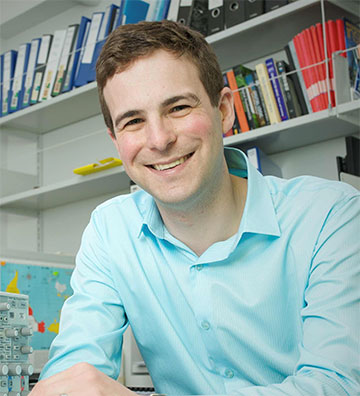
Ciaran Moore
In this installment of Senior Member Insights, OPN talks with Ciaran Moore, a senior lecturer in embedded systems at the University of Canterbury, New Zealand, since 2019. Moore received his B.E. (Hons) and Ph.D. in electrical and computer engineering from the University of Canterbury in 2007 and 2012. He joined the School of Engineering and Computer Science at Victoria University of Wellington, New Zealand, in 2013 as a lecturer, where he conducted research on near-field imaging and taught electronics. Moore lives in Christchurch, New Zealand with his wife, Angel, and their three children.
What first interested you in pursuing science?
I was fortunate to have very good teachers in primary school who took the time to do science experiments in class. I loved the idea that we could talk about a concept and then use that concept to predict which way the experiment would go.
I remember reading a poster about energy in the science classroom. The poster explained that a weight held at a height has some amount of potential energy, which gets converted to kinetic energy when the weight falls, so that the sum of kinetic and potential energy is constant. I read the text and the accompanying equation and thought, "Yeah, that makes sense!”
What aspect of your current work do you find the most interesting or exciting?
For me, there's a huge thrill helping students and clients learn how things work. Because if they understand how something—a circuit, a device, a machine—works, then they can change it, and they can use it to change the world around them, which is very empowering.
What tips for successful networking do you have for early-career professionals?
Life is a team sport, and you can't do it on your own. So you have to reach out to others. Don't worry, though, because the same rules apply to them, and often they are just as motivated to network with you as you are with them.
What professional resources do you rely on to stay active and engaged with your field?
Optica does a great job organizing conferences and publishing journals that are relevant to my work in plasmonics. In particular, scanning the “Newest Articles” section of the Optics Express webpage is great for keeping up to date with new research ideas and developments.
What skills do you think are most important for someone interested in a career like yours?
I like to think of engineering as the interface between humans and machines: they speak different languages, with engineers working as go-betweens. Machines tend to follow fixed rules and specifications, though, so much of the skill required is in communicating with people.
What advice do you have for young scientists who are discouraged about their current work or career path?
It's hard to gauge your own progress in real time: often you're doing more than you think and getting further than you think, even if it doesn't feel like it.
“You don't need brilliant breakthroughs to be brilliant—making small, regular, incremental improvements often achieves the same result, only with much less anxiety along the way.”
—Ciaran Moore
What is one piece of advice that you wish you were given as a student/early in your career?
You don't need brilliant breakthroughs to be brilliant—making small, regular, incremental improvements often achieves the same result, only with much less anxiety along the way.
What has been the most motivating factor throughout your career?
I'm fortunate to have a family—I got married toward the end of my studies, and my first child was born soon after. My wife and children are the reason I pursue my career; they also keep the setbacks and successes that go with that career in perspective.
What habits do you frequently rely on that help you to succeed?
I try to keep mornings free for difficult work that takes some time to tackle. Email is almost always urgent, and it can almost always wait until the afternoon.
If your ten-years-younger self was looking at your career now, what would he be most surprised by?
Perhaps the most surprising thing is the number of opportunities and experiences I've had that ten-years-younger me would have felt completely unqualified for. "I've never done that before" ended up being less of an impediment than I thought it would be.
